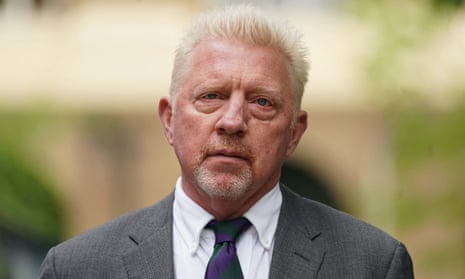‘I was a nobody’: Boris Becker gives first interview since leaving UK prison
Former Wimbledon champion tells German broadcaster he learned a hard lesson and experience was ‘worthwhile’

Boris Becker has given his first interview since leaving prison in the UK and being deported back to Germany earlier this week, telling German viewers: “In prison I was a nobody.”
The former Wimbledon champion, appearing slimmed down and sporting a new hair colour and style, told the broadcaster Sat 1 that as an inmate he was not called by his first name, and “no one gave a shit” about his champion status.
But he said he had used his 231 days in prison to reflect on his life, and had rediscovered the “mensch” or human side to himself.
In excerpts published in the tabloid Bild, the tennis legend, who was jailed in April for two and a half years for concealing £2.5m of assets to avoid paying debts after he had been declared bankrupt, said the food in Wandsworth prison in London, where he had spent the first weeks, was bad and the portions too small, while leisure activities were few and far between. He also said there had been a lot of violence.
Quick GuideHow do I sign up for sport breaking news alerts?
Show
The interview is to be broadcast this evening over two and a quarter hours from 8.15pm local time (1915 GMT).
Becker, 55, dressed in a black jacket and black T-shirt, said: “In prison you are a nobody. You are only a number. Mine was A2923EV. I wasn’t called Boris, I was a number. And nobody gives a shit who you are.”
Becker was transferred from Wandsworth to Huntercombe prison near Nuffield, Oxfordshire, in May.
Bild’s reporter said he cut a humbled figure, who had changed his hair colour and lost weight. He described him as surprisingly composed.
“I believe I rediscovered the human in me, the person I once was,” he told the interviewer Steven Gätjen. “I’ve learnt a hard lesson. A very expensive one. A very painful one. But the whole thing has taught me something very important and worthwhile. And some things happen for a good reason.”
Asked about his excitement to be finally leaving the prison and coming home last Thursday, Becker said: “From six o’clock that morning I sat on the edge of my bed, and hoped that the cell door would open. They came to get me at 7.30am, unlocked the door and asked: ‘Are you ready?’ I said: ‘Let’s go!’ I had already packed everything beforehand.”
While in Huntercombe, which is low-security and used to detain criminals from abroad before their deportation, Becker was reported by Bild to have trained regularly in the prison gym and to have worked as an assistant alongside the prison coach, helping with other inmates’ fitness and psychology, drawing on his experience as a former world No 1 tennis champion.
Becker’s son is still living in the UK. But under the terms of his release as a non-British citizen Becker himself has been banned from visiting the country for the next decade.
… as 2022 draws to a close, and you’re joining us today from Spain, we have a small favour to ask. It’s been a challenging year for millions – from the war in Ukraine, to floods in Pakistan, heatwaves across Europe, protests in Iran, global economic turbulence, and continued repercussions from the global pandemic. The Guardian has delivered rigorous, fiercely independent reporting every day. It’s been no mean feat. Will you support our work today?
Being a reader-funded news publication allows us to keep our journalism open and free for everyone across the world. This feels more vital than ever. In 2022, millions have turned to us for trusted reporting on the events that shaped our world. We believe equal access to fact-checked news is essential for all of us.
Unlike many others, the Guardian has no shareholders and no billionaire owner, so our reporting is always free from commercial and political influence. This emboldens us to seek out the truth, and fearlessly demand better from the powerful.
Now, more than ever, we understand not everyone is in a position to pay for news. But if you are, we need you this December. Whether you give a little or a lot, your funding will power our open, independent journalism for 2023 and beyond. And regardless of your ability to pay, we welcome you as a reader. Support just once from as little as €1, or to make an even bigger difference and unlock exclusive extras, consider giving €10 or more each month. Thank you.


No hay comentarios:
Publicar un comentario